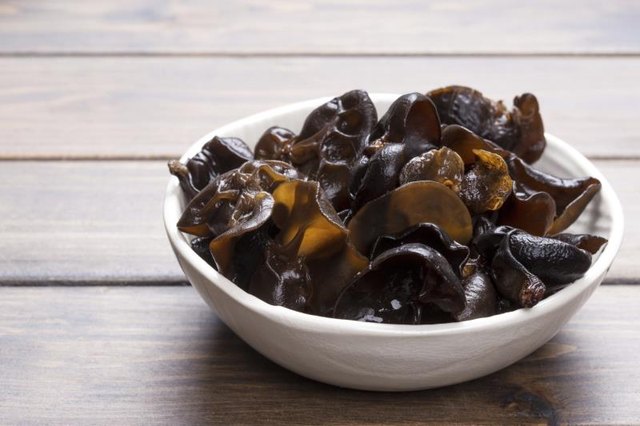
With their thin, gray-brown to black color and rubbery texture, wood ear mushrooms are not like your standard white or brown mushrooms. With no caps or stems, the wood ear mushroom, which is sometimes called cloud ear, tree ear or black fungus, is most commonly sold dried and is popular in Asian cooking. You can reconstitute dried mushrooms and then add them to soups, stir fries or even in salads. Their crunchy texture and dark, velvety color add an unusual element to even the most basic dish.
Calories, Macronutrients and Sodium
A 1-cup serving of wood ear mushrooms has only 80 calories and a negligible amount of fat -- less than 1 gram -- per 1-cup serving. This, plus the 2.6 grams of protein per 1-cup serving make wood ear mushrooms a high protein, low-calorie vegetable. Adult women should consume 46 grams of protein per day and adult men should consume 56 grams of protein per day, recommends the Centers for Disease Control and Prevention. Since wood ear mushrooms do not contain sugar and have only 10 milligrams of sodium per serving, keep your wood ear mushroom dish healthy by restricting the amount of added fat and sodium you use when cooking a dish made with wood ear mushrooms. The daily upper limit for sodium consumption is 2,300 milligrams per day, and only 1,500 milligrams per day for adults who are over 51 years of age, who have a history of cardiovascular disease or who are African American.
Rich in Dietary Fiber
Wood ear mushrooms have a high dietary fiber content. A 1-cup serving of wood ear mushrooms has 19.6 grams of dietary fiber. This is more than half the minimum recommended dietary intake for adults, which ranges from 21 to 38 grams per person per day. You should ingest 14 grams of dietary fiber for every 1000 calories consumed, states Colorado State University. This means that consuming 2 cups of wood ear mushrooms per day would provide between 100 to 200 percent of your recommended dietary intake for fiber.
High in Iron
Iron is an essential mineral you need to make blood cells. Iron is required to produce a number of proteins in your body, two of which are hemoglobin and myoglobin. These proteins carry oxygen throughout your body. A lack of iron can lead to anemia, which includes symptoms of fatigue, weakness and dizziness. The recommended intake for adult men and women over age 51 is 8 milligrams per day. For adult women 50 years old and under, the recommendation is 18 milligrams per day. A 1-cup serving of wood ear mushrooms has 1.7 milligrams of iron, which is between 9 and 21 percent of the daily recommendation.
Free-Radical Busting Vitamin B-2
Vitamin B-2, also known as riboflavin, provides support to your immune system and improves your body’s ability to tolerate stress. You also need riboflavin to convert carbohydrates into glucose to fuel your body, and it keeps your hair, skin, eyes and liver functioning and healthy. As an antioxidant, vitamin B-2 protects your body from the damage of free radical build-up, which may cause premature aging or increase your chance of developing cancer and heart disease. Free radicals are formed when your body breaks down food. A 1-cup serving of wood ear mushroom has 0.24 milligrams of vitamin B-2. The recommended dietary allowance for vitamin B-2 is between 1.1 and 1.6 milligrams. A single serving of wood ear mushrooms provides 15 to 22 percent of the RDA of vitamin B-1.





No comments:
Post a Comment